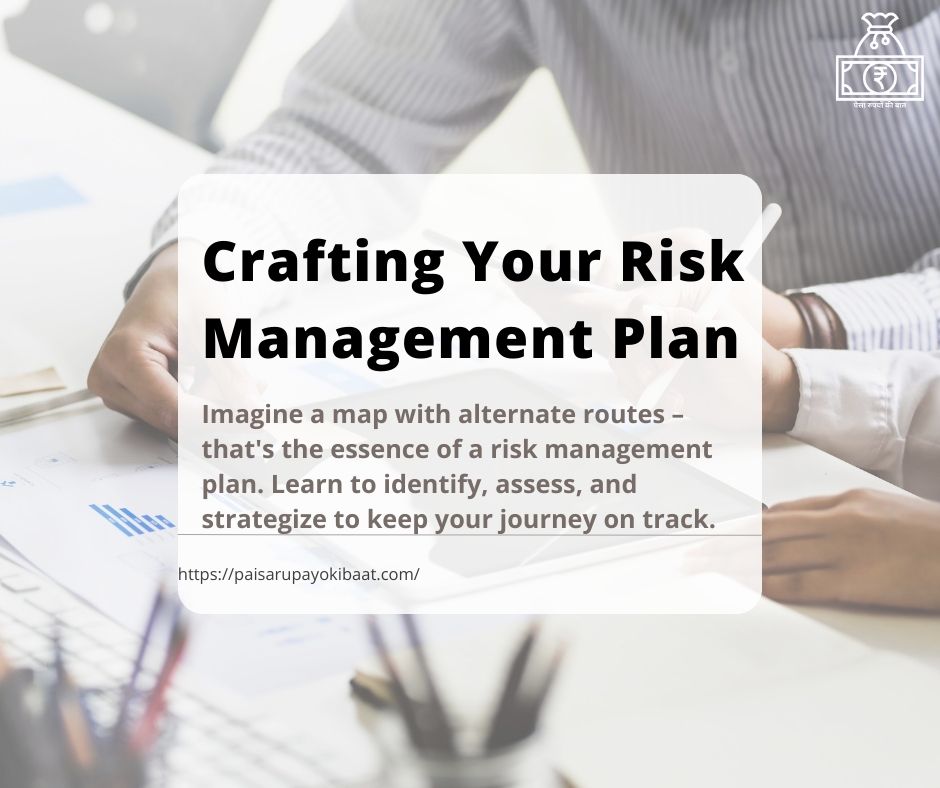“Process of Risk management | Risk Management Meaning | 2023″
Welcome to an extensive exploration of the world of risk management, a cornerstone of informed decision-making in both personal and professional spheres.
In this comprehensive guide, we will embark on an enlightening journey to delve into the essence of Risk Management, dissect its meaning, and intricately examine the nuances of the process.
Whether you’re a newcomer eager to grasp the essentials or a seasoned professional aiming to further hone your understanding, this article will serve as your ultimate companion, breaking down intricate concepts into easily digestible insights.
Risk Management Definition
- At its fundamental core, risk management is a structured and systematic process of identifying, evaluating, and mitigating uncertainties that have the potential to affect the attainment of goals and objectives.
- In essence, it’s like equipping yourself with an umbrella before stepping out into the unpredictable weather – risk management ensures you’re prepared for any unforeseen challenges.
Types of Risk Management
- The domain of risk management is not a monolithic entity but rather a multifaceted approach that caters to various aspects of life and business.
- Financial risk management addresses monetary uncertainties, operational risk management focuses on daily processes, and strategic risk management delves into long-term planning, each contributing to the overall resilience of an organization.
Decoding Risk in Project Management
- In the intricate world of project management, risk refers to unexpected events and uncertainties that could potentially disrupt the smooth progress of a project.
- It’s akin to carrying a spare tire during a road trip – you might not need it, but having it ready can be a lifesaver in case of a flat tire.
Distinguishing Non-Risks in Project Management
- Amidst the myriad components of project management, growth opportunities and innovations do not fall under the category of risks.
- Rather, these positive factors can serve as catalysts for progress when harnessed effectively.
Risk Management in Trading
- Trading is a realm where the potential for substantial gains is often balanced by the risk of significant losses.
- Risk management in trading involves meticulous calculations, strategic planning, and the implementation of measures to minimize potential pitfalls.
Crafting a Robust Risk Management Plan
- A risk management plan is akin to a comprehensive roadmap with various alternative routes plotted out. This structured approach involves:
- Risk Identification: Delve into a comprehensive analysis to identify potential risks and uncertainties.
- Risk Assessment: Evaluate the potential impact and likelihood of each identified risk.
- Risk Mitigation Strategies: Develop effective strategies to minimize the adverse effects of the identified risks.
- Continuous Monitoring and Adaptation: Regularly review, assess, and update the risk management plan to ensure its relevance to evolving scenarios.
Developing a Proactive Risk Management Strategy
- A well-crafted risk management strategy acts as a crystal ball, allowing you to anticipate and prepare for potential challenges.
- This strategic approach involves identifying emerging trends, foreseeing potential issues, and taking proactive measures to address them before they escalate.
Insurance’s Role in Risk Management
- Insurance is a fundamental tool within the realm of risk management. By paying a premium, individuals and businesses can effectively transfer the financial burden of certain risks to an insurance company, allowing them to focus on their core objectives without constant worry.
Utilizing the Risk Management Meter
- Visualize a gauge that quantifies the severity of various risks on a scale. This tool serves as a valuable aid in prioritizing risks based on their potential impact and likelihood, providing decision-makers with a clear and structured overview.
- Question: What constitutes the primary step in effective risk management?
Answer: The foundational step in risk management involves identifying and understanding potential risks and uncertainties.
- Question: Why is risk management a crucial aspect of decision-making?
Answer: Risk management provides a safety net against the unpredictable, ensuring that operations remain smooth and decisions are well-informed.
Implementing a Comprehensive Risk Management Plan
- A comprehensive risk management plan is composed of a series of strategic steps, each designed to enhance an organization’s preparedness and resilience:
- Risk Identification: Carefully identify and analyze potential risks across various domains.
- Impact Assessment: Evaluate the potential consequences of each risk on the organization’s objectives and goals.
- Strategic Development: Craft effective and actionable strategies to address and manage the identified risks.
- Ongoing Evaluation: Continuously monitor, assess, and adapt the risk management plan to ensure alignment with evolving circumstances.
Understanding the Significance of Risk Management
- The true essence of risk management extends far beyond mere crisis prevention. It empowers individuals and organizations alike to navigate uncertainties with confidence, armed with well-prepared strategies to tackle potential challenges.
- Its importance lies in its capacity to enhance decision-making, nurture resilience, and foster a proactive stance toward adversity.
Exploring the Benefits and Challenges of Risk Management
The benefits of effective risk management are multifaceted and impactful, spanning across various aspects of an organization’s operations:
- Enhanced Planning: Risk management fosters a culture of preparedness, enabling organizations to anticipate and plan for potential obstacles.
- Optimized Resource Allocation: Organizations can allocate resources more efficiently by factoring in potential risks and uncertainties.
- Stakeholder Trust: Stakeholders, whether investors or clients, gain confidence in an organization that demonstrates a robust risk management strategy.
However, the path of risk management is not without its challenges:
- Identifying Unknown Risks: While comprehensive analysis can identify many potential risks, the landscape of uncertainty is vast, and some risks may remain hidden until they materialize.
- Consistent Adherence to the Plan: Ensuring that all team members and stakeholders consistently follow the risk management plan requires dedication and clear communication.
Recognizing Limitations and Instances of Risk Management Shortcomings
- Even the most meticulous and comprehensive risk management plans can falter when confronted with truly unprecedented events.
- For instance, the global financial crisis of 2008 exposed the limitations of risk management models that failed to anticipate the complex interplay of various factors.
Inspirational Quotes on Risk Management
“In preparing for battle, I have always found that plans are useless, but planning is indispensable.” – Dwight D. Eisenhower
“Risk comes from not knowing what you’re doing.” – Warren Buffett
(“Level up your financial know-how with KuKu FM! Explore finance-focused audiobooks covering investing, budgeting, and wealth management. From ‘Rich Dad Poor Dad’ to ‘The Intelligent Investor,’ empower your financial decisions on-the-go. Learn while you commute, exercise, or relax – it’s finance education made easy with KuKu FM!”)
Use This code XJPYL9826 and grab Premium Subscription 50% OFF.
click here for Subscription
Conclusion
- In essence, risk management stands as a powerful compass, guiding individuals and organizations through uncharted territories.
- Equipped with a profound understanding of its meaning, process, and real-world applications, decision-makers gain the confidence to face challenges head-on and seize opportunities with unwavering determination.
- Remember, the essence of risk management isn’t to evade risks entirely but to transform them into stepping stones toward success.
- As you internalize the insights provided within this guide, may you emerge as a resilient, strategic, and informed decision-maker, navigating the dynamic landscapes of life and business with unwavering confidence and acumen.
FAQs
- What is risk management, and why is it important?
Risk management is a systematic process of identifying, assessing, and addressing uncertainties that could impact the achievement of goals and objectives. It’s crucial because it helps individuals and businesses prepare for unforeseen challenges, make informed decisions, and enhance overall resilience.
- How does risk management work in project management?
In project management, risk management involves identifying potential issues and uncertainties that could affect project progress. By planning for these risks, creating strategies to address them, and continuously monitoring and adapting the plan, project managers ensure smoother project execution.
- Can you explain the concept of risk management in trading?
Certainly. Risk management in trading is about minimizing potential losses while optimizing gains. Traders calculate and control their exposure to market fluctuations by employing various strategies to ensure that even if some trades go south, their overall portfolio remains balanced and profitable.
- How does insurance fit into risk management?
Insurance is an essential part of risk management. It allows individuals and businesses to transfer the financial burden of specific risks to an insurance company. By paying a premium, they gain a safety net that covers potential losses, enabling them to focus on their goals without constant worry about unforeseen events.
- What’s the significance of a risk management plan, and how do you develop one?
A risk management plan outlines how to identify, assess, and mitigate risks. It’s like a roadmap for handling uncertainties. To develop one, you need to:
- Identify potential risks across different areas.
- Assess their potential impact and likelihood.
- Devise strategies to manage or minimize these risks.
- Continuously monitor and adapt the plan based on changing circumstances.
Feel free to ask if you have more questions or need further clarification!
ऐसे ही और Interesting Financial Terms के बारे में हिंदी में सीखे :




“Excellent!”